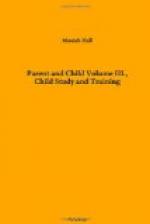Consciousness Is Expressed in Knowing, Feeling, and Willing, Each Phase of Which Should Be Developed Fully and in Perfect Harmony
As already remarked, the chief characteristic of the young child is ceaseless activity. From the time he is able to walk, or even crawl, the great instinct of curiosity is alive, and this at first is likely to lead him into all sorts of places where he should not go and cause him to investigate and even destroy some of the valued possessions of the household. This is a critical period in the development of the child and must be handled with rare judgment. Some knowledge of child psychology is essential here to guide the parent.
About this time three types of mental activity will be noted in the child.
(1) Feeling is one phase or type which expresses itself sometimes in pleasure or pain and at other times in action or anger. The feeling phase of consciousness gives color and tone to every act of life; it is the basis of interest; without it, neither happiness nor sorrow could exist, nor could there be faith or worship. When fully developed, it culminates in the emotions and sentiments, the highest of which are friendship and sympathy, love and duty, patriotism and reverence. The opposite of some of these is anger, hate and jealousy. Feeling makes heaven or hell a possibility and sometimes an actuality.
(2) The knowing phase of mental activity is aware of the outside world as well as of itself; it forms images of things and remembers; in its higher aspects it judges and reasons. This phase of consciousness makes possible invention and scientific achievement. By and through it, man overcomes his environment and makes himself the master of the earth.
(3) The volitional or will phase of mental activity is first manifested in the impulsive, spasmodic movements heretofore described. Later these random movements are brought under control, then comes the ability to select a desired stimulus from among several that are possible, and at length the power to choose between two or more possible modes of action. This highest form is termed voluntary action or will power. It is extremely important to note that the will is not a separate power or faculty which can be cultivated apart from other phases of consciousness. Many foolish things have been written about the power of the will and its capacity for infinite development; as a matter of fact, all three phases of consciousness must be developed together. Every act of the mind of necessity embraces all three phases, since it is impossible to know without feeling or to experience feeling or knowing without activity. The will, therefore, can never be quite so strong as the total consciousness; and at every stage, it needs the feeling phase to give it motive and the knowing phase to make it rational. Knowing, feeling, and willing, therefore, are merely convenient terms that express the varying, changing modes of consciousness, which at one time may be predominately feeling, at another knowing, and again willing. The great fact to remember is that consciousness develops as a unit, and the most highly trained mind is the one in which each phase is developed not only to its maximum but at the same time in perfect harmony with the other two as well as with the total consciousness.




